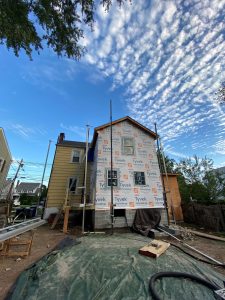New Jersey Consumer Fraud Damages and Attorneys Fees in Construction Projects Examined by Appeals Court
New Jersey construction law incorporates the damages provisions of the Consumer Fraud Act in residential home improvement construction projects. A New Jersey appeals court recently analyzed the recovery of triple damages and attorneys fees in construction projects under the Consumer Fraud Act, and personal liability for contractors, in two construction law decisions.
Background
Philip Dattolo hired EMC Squared, LLC to construct a new single-family home in Boonton, New Jersey. They signed a written contract. Toward the end of the project, Dattolo selected several additional items to be included. A written change order to the original signed contract was drafted, but the change order was never signed. In January 2020 the home passed final inspections, and EMC’s owner, Edward Morgan, advised Dattolo that he could not continue working on the project. Dattolo refused to pay “one additional cent,” and complained that there were numerous construction defects which would cost him thousands of dollars to remediate.
additional items to be included. A written change order to the original signed contract was drafted, but the change order was never signed. In January 2020 the home passed final inspections, and EMC’s owner, Edward Morgan, advised Dattolo that he could not continue working on the project. Dattolo refused to pay “one additional cent,” and complained that there were numerous construction defects which would cost him thousands of dollars to remediate.
The Lawsuit
In February, Datollo sued EMC and Morgan in the Law Division of the Superior Court of New Jersey for breach of contract and violation of the New Jersey Consumer Fraud Act for violation of the New Jersey Home Improvement Practices regulations because the change order was never signed. Interestingly, Datollo did not dispute that the Home Improvement Practices regulations applied, even though they provide that “Home improvement shall not include the construction of a new residential property”, thus explicitly excluding this project.
A two-day bench trial was held, after which the judge found that EMC breached the contract and owed Dattolo $29,603.95 in damages. He also found that failing to have a signed change order violated the New Jersey Consumer Fraud Act, but that there were no ascertainable damages because of that violation. Because the judge found that the damages were caused by the breach of contract and not the Consumer Fraud Act violation, the judge refused to triple them. He awarded counsel fees to Dattolo under the Consumer Fraud Act, but only against the company, not against Morgan because Dattolo had not proved that Morgan was personally liable. He awarded attorneys fees, but reduced the amount because the damages recovered were for breach of contract, not consumer fraud. The judge dismissed EMC’s counterclaim.
The Appeals
There were two appeals to the Appellate Division of the Superior Court of New Jersey. In the first appeal, Dattolo appealed the finding that Morgan was not personally liable for the judgment, and second that amount of the damages and attorneys fees were too low. The Appellate Division found that damages were correct, but that Morgan could be found individually liable, and the judge needed to examine the award of attorneys fees in greater detail.
In the second appeal, Morgan appealed the judge’s subsequent decision holding him personally liable for the attorneys fees awarded under the New Jersey Consumer Fraud Act, but not for the actual damages which were based on breach of contract, rather than consumer fraud. The Appellate Division affirmed the finding of personal liability.
Takeaways from the Appellate Decisions
There are several takeaways from the decisions.
First, an individual can be personally liable for consumer fraud, even when he is the owner of a valid limited liability company and otherwise protected by the “corporate shield.” Here, the LLC protected him from liability from the contractual damages because it was a valid limited liability company and not Morgan’s “alter ego.” However, the court explained that in the case of Cox v. Sears Roebuck & Co, the New Jersey Supreme Court ruled that under the New Jersey Consumer Fraud Act “[A] consumer-fraud plaintiff can recover reasonable attorneys’ fees, filing fees, and costs if that plaintiff can prove that the defendant committed an unlawful practice, even if the victim cannot show any ascertainable loss and thus cannot recover treble damages.” Thus, even though there were no damages attributable to the consumer fraud violation, EMC and Morgan could still be held liable for the owner’s attorneys fees under the Consumer Fraud Act.
Second, in order to recover damages which can be tripled, an “ascertainable loss” must be caused by the consumer fraud. If there was consumer fraud but no ascertainable loss caused by it, there will be not resulting damages to be trebled.
Third, the $15,000 amount of attorneys fees was not the full amount sought by Dattolo. The Appellate Division upheld the trial judge’s reasoning that because Dattolo’s damages were for the breach of contract – which did not entitle him to an award of attorneys fees – some portion of his fees had to be allocated to that, and the amount of attorneys fees awarded for consumer fraud had to be reduced by that amount.
Finally EMC and Morgan might have been able to avoid the award of attorney fees entirely had they challenged the applicability of the Home Improvement regulations in the first place. The decisions made clear that they did not, but did not explain why.
Contact Us
Our attorneys assist contractors, subcontractors, vendors and owners in all aspects of New Jersey construction law. Call (973) 890-004 or fill out the contact form on this page to schedule a consultation with our New Jersey construction lawyers. We can help.
 New Jersey Lawyers Blog
New Jersey Lawyers Blog

